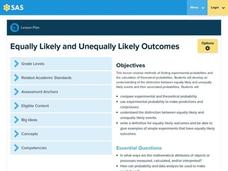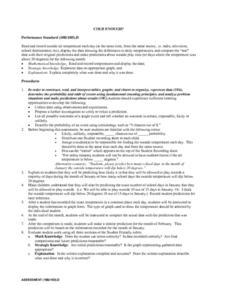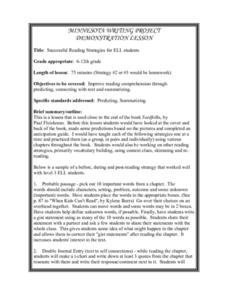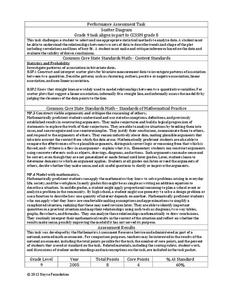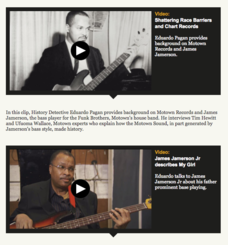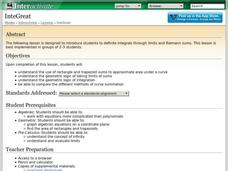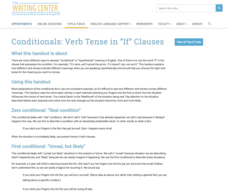Curated OER
Chemistry 12 Tutorial 2 - Enthalpy and Entropy
A beautifully designed, eighteen-page chemistry tutorial awaits your learners. The main topics: enthalpy and entropy. By completing this instructional activity, students will be able to define these concepts, determine whether each is...
Curated OER
Assessing and Investigating Population Data
Learners examine population projections. In this population data instructional activity, students research and collect data on the population of the United States. They explore and conclude future population growth patterns. Learners...
Pennsylvania Department of Education
Equally Likely and Unequally Likely Outcomes
Students explore probability. In this statistics/probability lesson, students compare experimental and theoretical probability and use experimental probability to make predictions and conjectures. Students explore the distinction...
Pennsylvania Department of Education
Volume and Surface Area
Build boxes using unit cubes to compare surface area and volume. The group performs multiple experiments to determine properties of volume, such as if it makes a difference which order the dimensions are multiplied in. Extensive...
Curated OER
Cold Enough?
Students read and record temperatures and display the data. They represent the temperatures on an appropriate graph and explain completely what was done and why it was done. Students display the data showing differences in the daily...
Virginia Department of Education
Passing Traits to Offspring
What makes each one of us unique? Lead your class in this exciting and educational activity as you uncover traits that show how each individual is different from another. Pupils explore facts about DNA technology and predict the...
Curated OER
Total English Advanced: What Does the Future Hold?
In this future probability practice instructional activity, students interview 3 other students regarding predictions for the future and then create a written summary of the predictions.
Serendip
A Scientific Investigation – What Types of Food Contain Starch and Protein?
You are what you eat, as they say! Are you more starch or more protein? Young scholars use their knowledge of each component to test different foods for their content. Using multiple indicators, individuals describe the protein and...
Curated OER
Chemical Equations
Wow! This comprehensive collection of slides will walk your chemistry class through the foundation of chemical reactions, teach them to balance equations, differentiate types of reactions, and calculate stoichiometry problems. This will...
Curated OER
Grade 5: Alphabet Frequency
Fifth graders collect and organize data from writing samples, use fractions and decimals to describe the experimental data, and use the experimental results to make predictions about the frequency of letter usage in the English language.
Curated OER
Successful Reading Strategies for ELL Students
Students improve their reading comprehension through predicting, connecting with text and summarizing. Students should have already read the book Seedfolks and made predictions based upon what they had seen from the cover and pictures...
Curated OER
Investigation 8 - Weather Forecasts
Fourth graders examine how to predict and evaluate weather forecasts. Discuss with students why weather predictions are important to us. Ask them what people do after they hear a forecast. They brainstorm reasons forecasts are important...
Curated OER
Estimation Investigation
Students view an interactive video to explore the concepts of estimation. They work cooperatively to measure, make comparisons, make predictions, and verify results.
Inside Mathematics
Scatter Diagram
It is positive that how one performs on the first test relates to their performance on the second test. The three-question assessment has class members read and analyze a scatter plot of test scores. They must determine whether...
Curated OER
Don't Let Parabolas Throw You
Learners identify relation, function, patterns and range. In this algebra instructional activity, students factor and graph quadratic equations. They use transformation to move the parabola around and make predictions.
Curated OER
Night of the Twister
Students use reading strategies for Night of the Twister. In this reading strategies lesson, students name five major catastrophes and books about each. Students complete a vocabulary section, make inferences and predictions, read the...
Alabama Learning Exchange
Bloodstain Pattern Doesn't Lie......
An interesting instructional activity on hypothesizing about the diameter of a drop of blood that is splattered. To test their theories, learners work in groups to make blood droplets splatter from different heights. They use graphed...
Curated OER
Stochastic and Deterministic Modeling
Explore the difference between stochastic and deterministic modeling through programming. First have the class write algorithms for relatively simple tasks using pseudocode. Use the Python 2.7 program app to simulate Mendel's Pea Pod...
Curated OER
Reading Comprehension 6: Level 12
Although designed as an assessment, consider using this resource as the basis for a lesson on reading comprehension strategies or as a practice exercise. The five multiple choice questions, based on a short passage about stock market...
PBS
The Sixties: Hitsville USA
James Jamerson. You probably heard him but may not have heard of him. But fans of Motown Records will certainly recognize his contributions to the sound that desegregated popular music during the 1960s. Challenge young history detectives...
Shodor Education Foundation
InteGreat
Hands-on investigation of Riemann sums becomes possible without intensive arithmetic gymnastics with this interactive lesson plan. Learners manipulate online graphing tools to develop and test theories about right, left, and midpoint...
University of North Carolina
Conditionals: Verb Tense in “If” Clauses
"If you give a mouse a cookie, then he's going to ask for a glass of milk." These iconic words from Laura Numeroff's classic tale offer a great example of conditionals, a topic covered in the handout as part of a larger writing series...
Curated OER
What are the Odds
Young scholars predict the-outcome of an event. In this algebra lesson, students compare and contrast the probability of an event occurring. They calculate the odds of a simple event and make estimation.
Curated OER
"The Giver" by Lois Lowry
Students predict results, design a model, and carry out trials to determine probability based on their experimentation.




